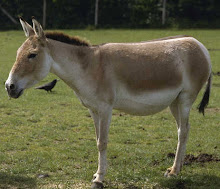(EDITED - I found the post I was looking for - thanks to Technorati - and have edited to reflect and include links)I don't usually stray into political matters -- there are far better informed sites for that (and I'm going to add a list of those sites soon). But yesterday I read
this post at
Window On Eurasia on remarks by Russian President Vladimir Putin about his chosen, I mean elected, successor, Dmitry Medvedev, and it makes me wonder . . .
I'm kicking myself for not bookmarking this page (
FOUND IT!),
but the gist was that In this speech, Putin described Medvedev's "Russian nationalism" with the word that means "ethnically Russian" --
russkiy -- instead of
rossiikiy, which means "citizen of Russia." It makes no difference in English, and perhaps in many European languages --
Russian and
Russian are the same. But the post points out that there's a big difference in Russian, especially given the fractured ethnic politics of the country. Saying "Russia for the ethnic Russian," instead of "Russia for the citizens of Russia" signifies a HUGE difference in political ideology.
So how does this relate? I see a correlation in language between
Kazakh (as an ethnicity/nationality), and
Kazakhstani (as an identity-card-carrying citizenship), but no similar examination in Central Asian coverage on language use. Americans (with whose language I am most familar), blithely use
Kazakh to mean "citizen of Kazakhstan," but none of the non-ethnically-Kazakh citizen of Kazakhstan I know would accept that term to describe themselves. Few have commented on the government's recent move to use
Kazakh as a term for all "citizens of Kazakhstan," even though the pictures show Asian, Eurasian, Turkic, Slavic and European faces. Ignorance, complacency, or an identity shift I have yet to accept?
It seems to me that until all the native-born citizens of the country speak the same language as they settle into nationhood, words matter a lot. Until employment and educational opportunities are equalized for all citizens, regardless of "nationality" (because everyone speaks the same language), a pan-nationality term --
Kazakhstani in English -- is politically inclusive, as the politicians claim to be. One generation more, and maybe they're there. Is that really so long to wait to make all citizens feel like they belong?
 Admittedly, it's a bit lame to have two posts in a row on the same topic, especially months apart. Alas, that's how it is. But the good news is . . .
Admittedly, it's a bit lame to have two posts in a row on the same topic, especially months apart. Alas, that's how it is. But the good news is . . .







 This past Saturday (May 17), KZ "ethno-pop" trio Urker released
This past Saturday (May 17), KZ "ethno-pop" trio Urker released  The band has been leading up to the album release with a series of live performances -- Urker's Nauryz concert was their first live outing in five years, and on May 8 they played at London's Ministry of Sound music club, their first time to play Britain (
The band has been leading up to the album release with a series of live performances -- Urker's Nauryz concert was their first live outing in five years, and on May 8 they played at London's Ministry of Sound music club, their first time to play Britain (

















